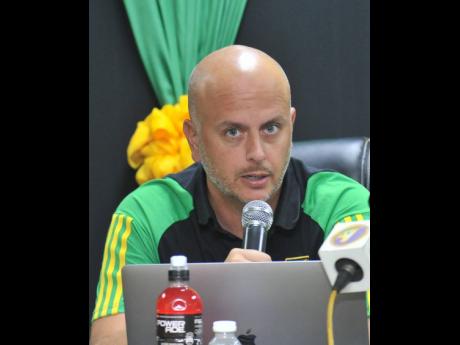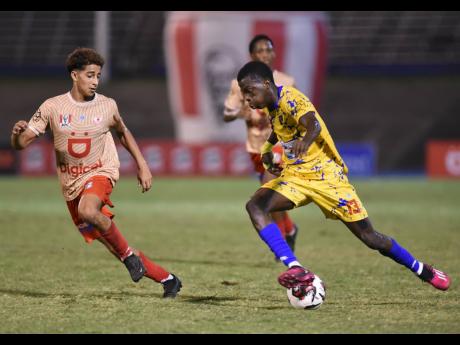Schoolboy football not the answer – Wall
NATIONAL UNDER-20 coach John Wall said it is difficult for him to relate to schoolboy football as being the vehicle for player development, saying it is contradictory to the developmental pathway the rest of the world uses.
Speaking at a recent Jamaica Football Federation (JFF) press conference, Wall, the senior team assistant coach, said players moving from schoolboy football into top-level football, as is the case of Dujuan ‘Whisper’ Richards, is an anomaly.
He argued that Jamaica’s young players are not at the standard to make that jump regularly, and believes that to consistently transition young players into senior professional footballers, the country need to create a process similar to what is used worldwide.
“The main benchmarks, if you look at it globally, and when in discussions with the technical committee and everyone, I have used Denmark and Uruguay as benchmarks, as it is very close in terms of the (population) size of the nation.
“Denmark’s under-21, and I am talking two highest leagues, by October 2023 had 21,885 senior professionals and a squad market value of €29 million.
“Uruguay, who won the under-21 [World] Cup, have 18,000 senior professionals, since October and a squad market value of €28 million. How close is Jamaica to that on a global scale?” he asked.
He insists that the Jamaica Premier League (JPL), which is semi-professional, is the closest most local players come to professional football.
He also pointed out that the demand for younger talent keeps growing but that the development of the nation’s young talent was severely hampered by the COVID-19 pandemic.
“Globally, how close are the players to playing senior professional football? The margin now is that players are getting younger and younger. They are better educated and they are, in a way, pre-selected.
“Domestically, we are looking at the group that has probably been hit the most by COVID. They did not play too much at all.
“So it has been a race to the bottom, a depletion of the pool domestically, and that has been my observation,” he continued.
That isn’t the only issue though, he reasoned, saying schoolboy football is not the answer to producing senior professional footballers.
“Unfortunately, I cannot relate to schoolboy football and convert that to global football. I cannot. It’s a different game. So for me, we have to look at how we can recreate it in our environment.
“It is sad to say, but that is how far it’s gone. You are looking at players who are playing a very limited amount of time and have very few competitive months on the global scale,” he said.
Nevertheless, he revealed that some schoolboys have been included in his roughly 80-man squad that will be reduced to a provisional 60.
According to Wall, scouting has taken his team far and wide for the best talent.
“Yes, there will be some (schoolboys) but there are no more anomalies coming directly from schoolboy football and (going) directly into the international game. That’s not your standard.”
He also believes the schoolboy competitions are a hindrance to the national programme, as it is difficult to access players for training over those three months.
“It has been a process ever since March. On a monthly basis, with the exception of July, and except for September, October and November (schoolboy football months) because everyone kind of knows what Jamaica is all about. It’s pretty hard to get access to the players.”


